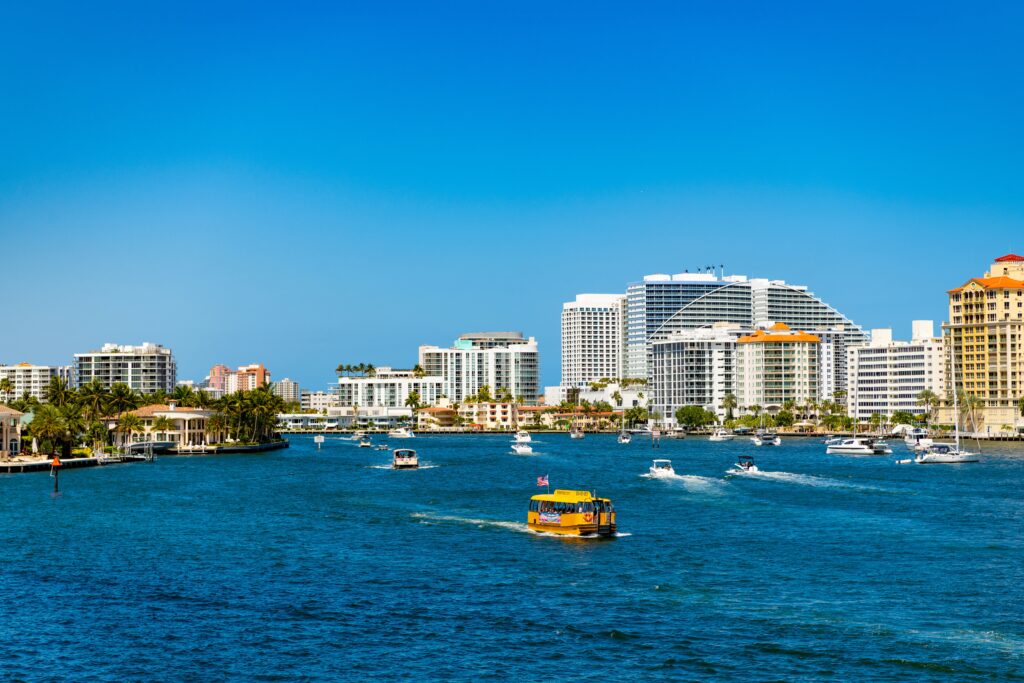DI and Fort Lauderdale encourage supporting local destinations by continuing to bring events
When the news came out about the Visit Florida removal of its LGBTQ+ resources page from its site, it sent the media into a tailspin, and in turn, all of us who consume it. What will this change mean for meeting professionals planning events in Florida with help from the nearly 40 CVBs and DMOs throughout the state?
First, some background. The page’s removal from visitflorida.com occurred at some point between April 19, 2024, the last known date the landing page was accessed, and early August, according to a CBS report. Visit Florida did not issue a press release announcing the change and was vague about the reason for the change when pressed in late August at a press conference.
This development comes on the eve of controversy regarding Florida Governor Ron DeSantis’s May 2022 passage of the controversial Parental Rights in Education Act, widely termed the “Don’t Say Gay” law, and the lawsuit that ensued, which ended with a clarification of the law that determined teachers and students had the legal right to discuss gender and sexual orientation as long as it wasn’t included in official instruction.
Criticism and Visit Florida’s Response
Several organizations throughout the state have responded to Visit Florida’s decision with criticism, calling it LGBTQ+ erasure or discrimination, often citing the “Don’t Say Gay” law and noting that the site still has destination guides for other demographics, such as “African American Heritage Travel,” “Hispanic Heritage” and “Family-Friendly” as well as many travel recommendations for people with disabilities.
Local destination marketing organizations throughout the state, including Greater Miami Convention and Visitors Bureau, Visit Orlando, Visit Greater Fort Lauderdale, Visit Tampa Bay, Visit St. Pete-Clearwater and many more include a LGBTQ+ resources section on their websites.
Stacy Ritter, president and CEO of Visit Lauderdale, told Smart Meetings, “When it comes to the economic impact, there is no way that this decision by Visit Florida has a positive economic impact on the state.” Visit Lauderdale welcomes over 3 million LGBTQ+ visitors each year, who spend over $1.3 billion in the area.

“When ‘Don’t Say Gay’ was passed a few years ago, we lost some business, and then when they passed the second iteration of it, a year after that, we lost some business. It has calmed down because the legislature didn’t do anything this past session to draw attention,” she said. “I expect that this will—it already has—drawn quite a bit of attention across the county and across the world, and that there will be some conferences that will take another look at us as a state and as a destination.”
From a long-term perspective, Ritter said, “We already know that there are RFPs that won’t be sent to Florida—any destination in Florida. We don’t even know what we’re not able to bid for, so that lost business is impossible to quantify.”
Maryann Ferenc, owner of the modern French-inspired restaurant Mise en Place in Tampa and a former Visit Florida board chair told NBC, “Why would we do this? If it’s an economic decision, I can’t see how it’s a good one,” citing tourism as Florida’s number one industry.
During her time on the board, from 2017-18, Ferenc recalled a large amount of LGBTQ+ travel information being available on Visit Florida’s website. Following the Visit Florida removal of its LGBTQ+ resources page, she observed, “All of our diverse markets are important to us getting all of the business that is our fair share of the statewide, national and international tourism market…It’s important that we have that diversity, not only because of the amount of money that will be spent by a diverse market, but by the diverse places in which that money will be spent.”
On Tuesday, Aug. 27, Visit Florida CEO Dana Young addressed the issue for the first time, during Visit Florida’s board of directors meeting in Tampa, saying, “It’s fairly simple. Visit Florida is a taxpayer-funded organization and, as such, Visit Florida, our marketing strategy, our materials and our content must align with the state. Florida has always been and will continue to be a very, very welcoming state.” When asked by members of the press, she declined to comment further.
Governor Ron DeSantis stated, during a Polk County law enforcement press conference, “We’re open to all. But we’re not going to be segregating people by these different characteristics. That’s not how we’ve done business and any of the things that we’ve done.”
What Does it Mean for Meetings?
Amid the controversy around the “Don’t Say Gay Law,” the meetings and events industry, as well as the tourism and hospitality industries, saw a rise in the call for destination boycotts, not only in Florida, but nationwide, in instances when governing entities had introduced or passed legislation that potential visitors, meeting attendees included, disagreed with politically. Now, with the removal of Visit Florida’s LGBTQ+ Resources page, the question that seems to be on everyone’s mind, once again, revolves around if we will once again see calls for boycotts.
Destinations International (DI), the global association for destination professionals, takes a firm stance on destination boycotts: That they don’t work, and they don’t actually help to solve the issue at the center of the boycott. DI’s 2024 annual convention took place just this past July, in Tampa Bay. There, DI CEO Don Welsh addressed destination boycotting in his opening address, demonstrating that the issue remains top of mind for destination professionals as well as planners.
Read More: DIAC24 Recapped: Happy Communities, Strong Destinations
Jack Johnson, DI chief advocacy officer, spoke with Smart Meetings in light of the emerging news of the Visit Florida removal of its LGBTQ+ resources page to offer insights and advice about what the industry could expect—and what to do.
The Destination Marketing Perspective

Johnson explained that, with his perspective as a representative of the inner workings of destination marketing organizations, there is an optimistic way to look at the issue. “I think you can argue that what the state of Florida has done doesn’t mean that they’re not welcoming to LGBTQ+ travelers,” he says. “I do think that it means that Visit Florida has made a marketing decision—perhaps to roll LGBTQ+ outreach into their general campaign, as opposed to a standalone. Now, whether that’s a good decision or not, we will wait to see how that plays out.”
However, he went on to express that the concerns being raised about the Visit Florida removal of it’s LGBTQ+ resources page valid and important. “As a gay man, I can say that it’s also understandable that that the LGBTQ+ community, or many of us in the community, would feel this change is misguided or even worrisome,” he said. “Let’s face it: we have not always been welcomed everywhere. We are not welcomed everywhere. We have been harassed, had our safety threatened at various places and continue to be in various places across the globe.
“The creating of [LGBTQ+ resource pages on DMO websites] was a way of a destination saying, ‘We understand that, and we’re reaching out to you, and welcoming you and we want you to know that you are as welcome here as anyone else.’”
The Big Question: What Should Planners Do?
Johnson noted that many Florida destinations continue to push the message of inclusivity for the LGBTQ+ community as well as for other demographics. He also stated that, “Whenever something happens in Florida, it seems, the prospect of boycotts comes up. But it’s counterproductive.” Florida saw record tourism of 140.6 million visitors last year.
He explained that DI’s recent convention in Tampa demonstrated the power of bringing groups rather than boycotting. “Show up and get involved. Make a statement of what you believe in. Engage those communities who say they feel marginalized.
“It’s really up to Floridians to change things. What we can do is do is empower them. That’s showing up, so they can still have a job. Then, they can lobby their legislators and work on their political system.
“Boycotting rarely, if ever, achieves that type of goal when it comes to travel, whereas empowering the people who are on the ground working for the change that you believe in can actually make a difference.”
When planners host a meeting in any destination, whether there is controversy surrounding that destination or not, Johnson offered some practical steps for creating meetings that are more inclusive and equitable.
Working with the Community
Look for ways to access the talent and the knowledge that exists in that destination. This isn’t only a means to the sole end of enhancing and improving the meeting or event; it is a way to engage the community with the meeting. Attendees, more and more, want an authentic destination experience, so taking steps to include the destination in meetings and events, as well as offer attendees opportunities to see the destination outside the meeting room, is instrumental to meeting that desire.
One of the meeting planner’s best resources is the local convention and visitors bureau (CVB), Johnson advised. “They have the connections. They have the power. The have the network that they can help tap you into.”

Pay attention to the diverse groups in your overall attendee group, as well as in the destination. “There are businesses that are upfront about being welcoming,” Johnson says. “There are people on the ground who can make connections to groups that are either socially involved with those marginalized groups, or to the more politically active groups that are working on behalf of that marginalized community.”
Johnson cited an example in DI’s 2019 convention in St. Louis, during a time when the state of Missouri was reviewing legislation restricting abortions. “We had members who felt uncomfortable going, but at the same time recognized that going was important.” DI connected attendees with a local Planned Parenthood and then got out of the way. They identified restaurants and businesses visitors could support and made sure that business knew why the guests were there and who had sent them. “That was a positive development. They empowered people who were on the ground in St. Louis working on something, and they still got to come to the annual convention.”
Stacy Ritter told Smart Meetings that continuing to bring meetings and events to Lauderdale is critical for creating positive impact. “I think that just coming here sends a message that you embrace the values that Broward County embraces.” Like Johnson, she encourages planners to be strategic about the businesses they contribute to financially—seek out those businesses that share your values.
“We’re a tourism-based economy. When people stop coming, businesses die. They close and people lose their jobs. Our mission at Visit Lauderdale is to bring tourists through. Our calling is to keep people employed. We saw what happened when visitors stopped coming four years ago; tens of thousands of people lost their jobs,” she explained.
“So, we are going to continue to encourage groups to come here, conventions and conferences to come here, to show support for the values that we represent as a destination and as a county, and to patronize those businesses that also share those values.”
“Aside from the advocacy that I’m hoping [locals] will do, we’re going to encourage people to come here to show support for LGBTQ+, minority-owned businesses, woman-owned businesses,” said Ritter. “Express your values through your pocketbook.”
Read More: Buycott, Don’t Boycott
Creating a Welcoming Environment for Attendees
In some cases, such as this particular instance with the Visit Florida removal of its LGBTQ+ resources page, some attendees may cite safety as a concern. Johnson responded to that concern. “If the issue is safety, go to the destination organization. [At the 2024 Destinations International Annual Convention] we had the mayor, the former police chief, come onstage to say, not only are you welcome, but you will be safe. We had members from the community explain, we live here every day, and we have a political problem. We can use your help, but you will be safe.” Again, many of the solutions to any problems that arise come from working closely with destination partners.
“Use that destination organization,” Johnson encouraged. “Say, ‘These are the fears that have been raised by my membership. How can we address them together? How can our people feel as if they came here and then left the place better than it was before, empowering those on issues that they truly believe in?’” Planners have the power to be intentional about where their money goes, and where their attendees’ money goes—connect with the partners who are doing the work to make the changes you want to see in your meeting’s destination.
Johnson offered specific steps planners can take to help both the destination’s community and their attendees feel involved in a safe and inclusive environment. From educational sessions, to working with local groups, to local business marketplace pop-ups on the show floor and bringing in advocacy organizations.
Know your audience well enough to provide the right form of education, outreach and destination experiences for them to reach their goals both in the meeting room and in the destination.
“We really like to talk about change,” Johnson said, “but despite that, we don’t really like to change.” He added, “The only time that you really change is when you hit a wall or rock bottom—and that’s not a good scenario. The only other time is when you travel. That’s when you open yourself up to seeing things—and it works both ways. Part of the joy and genius of travel is that the effect isn’t just on the visitor; the effect is on the resident as well. That, and small steps, all together, create this wave that, in the end, I think works to everyone’s advantage.”
Watch a segment of Sara Roberton’s interview with Jack Johnson in the video above.




